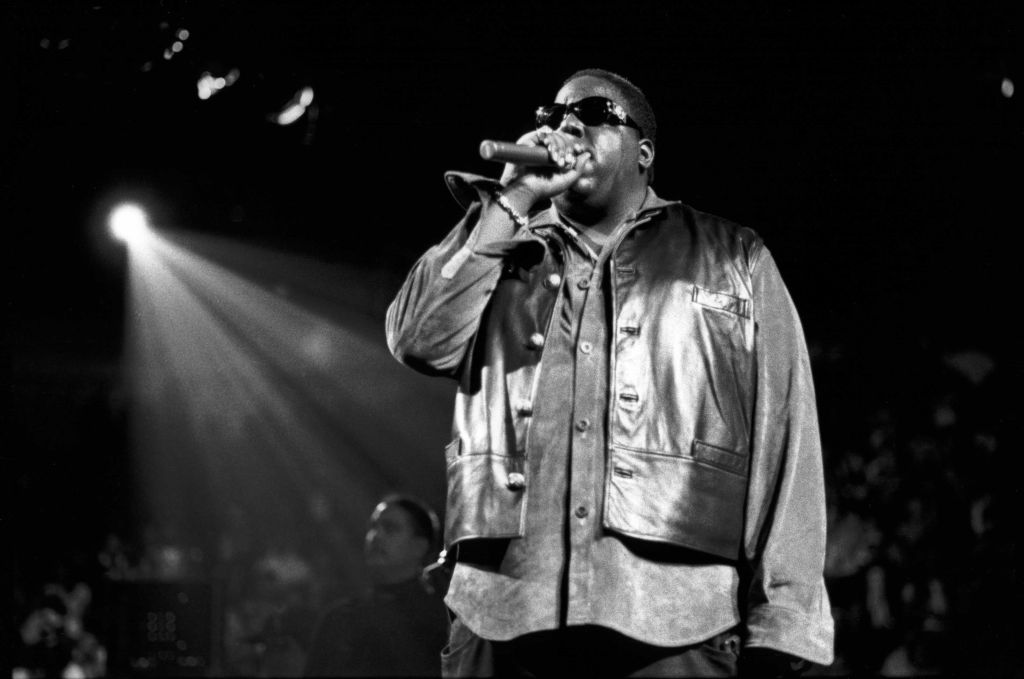
Source: David Corio / Getty
It’s become an obsession for hip-hop fans. The kind of puzzle that has you staring at a large, wooden vision board, blue string and thumbtacks drawing together disparate pieces of information into a mythological whole. The question: Who shot Biggie Smalls? The answer is no one who knows is talking, and nobody who’s talking knows. But the thing that bothers me the most isn’t how the death of Biggie rearranged my childhood, it’s how such a high profile case could go cold so soon after it happened and stay frozen nearly 20 years later.
The attention and the dollars are there. USA’s Unsolved: The Murders of Tupac and The Notorious B.I.G gets each episode reviewed in Billboard and rave reviews. Jon Caramanica at the New York Times called it “appealingly pulpy.” Vulture called it “absorbing” and “provocative.” The show is based on Murder Rap: The Untold Story of the Biggie Smalls & Tupac Shakur Murder Investigations by Greg Kading (the detective who lead the task force that reopened the case in 2006). The twists and turns of the case are fascinating and malleable. Two of the greatest rappers of all-time dying over a beef that was at its worst a misunderstanding makes for high drama entertainment.
Except this is common in the Black community. A great sum of cases are simply never solved, yes, but sometimes if you’re Black, you can get a killer on tape and nothing will happen. We’ve all seen the video of Eric Garner being strangled to death by NYC officer Daniel Pantaleo. But a New York Times inquiry states that the chokehold wasn’t even in the original post-incident report. It wasn’t mentioned at all. This case is, for me, a cold one: no one will ever be arrested or charged. We can go on and on. Philando Castile’s shooting was caught on FB Live for the world to see. Nada. Sandra Bland strangely died in police custody after an arrest caught on tape showing a clearly agitated officer. Nada. Kalief Browder was tortured (some of his beatings were recorded), languishing in prison for years awaiting trial. Nada.
There is a theory to the B.I.G. murder that weaves its way inside you. That Suge Knight and a couple of LAPD officers hooked up and did the deed. The others are more plausible: Knight did it out of retaliation for ‘Pac or the Southside Crips committed the murder over unpaid debts. Eventually, the ten-part series will delve into all three possibilities, but hip-hop had been a growing preoccupation for law enforcement in New York and elsewhere for a while, especially in the late ’90s. At the time, a “hip-hop cop” named Derrick Parker had been trying to do his job as a detective and usher the police into the murky world of whisper networks, crime, and rap. By 1999, he found himself at the top of his own rap-intel-unit.
The increased scrutiny regarding rappers and the hip-hop industry, the Venn diagram of Biggie, the police, and his murder are forever intertwined.
The Miami PD and NYPD finally admitted it had just such a thing back in 2004 as reported on by The Village Voice, “We have an intelligence division and we have detectives that monitor the music industry and any incidents regarding the music industry,”said Officer Doris Garcia. “And in regards to Miami P.D. we did exchange information, and that’s it.”
Sure, sure. The concern isn’t officers doing their jobs, it’s the motivations behind it. Activities with a large number of Black people involved incite skepticism, a mythology that ultimately does harm. From predatory lending practices to no lending at all, from higher rates of Alzheimer’s due to the stress caused by discrimination. The increased scrutiny regarding rappers and the hip-hop industry, the Venn diagram of Biggie, the police, and his murder are forever intertwined. But this case does something else: it underlines the surreality of African-American life. You are never quite as human, it seems, but never quite as villainous either. So you end up being a caricature and your life ends up a tragedy or a romance or both. And, really, Christopher Wallace deserves better.
In the end, the Notorious B.I.G was a human being, a genius emcee, a deeply flawed husband and father who was so young ( just 25-years-old) when he died that you have to stand in awe at what he was able to accomplish. His murder, its intrigues and double-crosses, will forever be interesting.
But I’d love to see a side of him that was human on television instead of a mythic legacy that ended with a bang. Instead, we’ve martyred the man twice over.
















